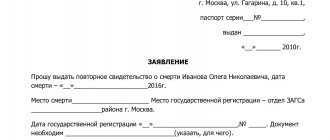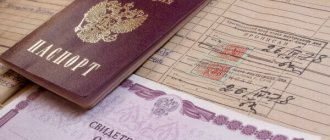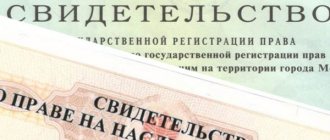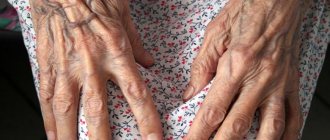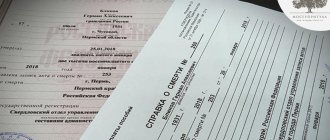What it is?
This is a patent confirming the fact and cause of a person’s death. There are two types of certificates: medical and legal .
The medical certificate is created by the doctors of the hospital where the person’s death was determined.
This document is needed to ensure state registration of death, as well as for statistical recording of data. This document can be issued in any medical organization in which a person suffered the last minutes of life.
A legal certificate allows the relatives of the deceased to enter into an inheritance and subsequently dispose of the received property with full rights. It also automatically provides relatives with a certain amount for the funeral and a place in the cemetery for the grave.
This document can also be issued by court decision in cases of missing persons. A person is declared dead on the fifth anniversary of the disappearance, in some cases six months later.
How to prepare an application for establishing the fact of death
The application is submitted to the court at the place of residence of the person applying to establish the fact of death. It is for this person or his children that certain legal consequences must occur. For example, in our example, the mother, as the legal representative of the children, goes to court to ensure their rights.
The collection of evidence must be done carefully: this includes witness statements, appeals to the police, other authorities, certificates (for example, about a fire, flood). The purpose of filing an application to establish the fact of death determines the list of interested parties. However, the court in any case involves the guardianship authority and the prosecutor to participate in such cases.
Who should apply and when?
An application to register a death can be submitted by either an organization or an individual. Whoever is eligible to submit an application has all the necessary documents for filing. Usually these are relatives of the deceased, or organizations such as:
- prison institution (if the person died while serving his sentence);
- investigative committee (in case the person could not be identified, or during an investigation);
- medical institution (if a person died in it);
- commander of a military unit in the event of death of those serving.
Usually a statement is written no later than three days after the incident; it is especially necessary to do this before the funeral. As a rule, if this condition is violated, the loved ones of the deceased person will not face fines or punishments.
Grounds for the court to establish the fact of death
The website provides recommendations and examples of statements similar in content:
- application for recognition as missing
- declaration of death.
Despite the similarity of statements, the evidence in civil cases differs. Because the range of circumstances to be proven is different.
When submitting applications from group 1, you must prove the fact that the citizen is absent from his place of permanent residence. And the lack of information about him. An application to establish the fact of death is submitted when the applicant (the one who applies) has reliable and irrefutable evidence of death. But he cannot confirm this fact with medical documents. For example, the hospital archive was destroyed, the doctor was not called on time (relevant for remote areas), etc.
Can an ex-husband or wife take a second duplicate?
The ex-spouse can obtain a certificate if it is needed for some reason. It is best if the ex-wife or husband has children from the deceased. The former half is unlikely to receive the original certificate, but definitely a duplicate.
To do this, you need documents that will confirm your blood relationship with the deceased. They must apply to the registry office or obtain the document in other ways.
The application must provide the following information:
- Name of the registry office.
- Passport details of the applicant.
- Address of registration and actual residence of the applicant.
- Ex-spouse details.
- Date and place of death.
- Information about the registry office in which information about death is recorded.
- Date of record of death of ex-spouse.
- The reason for the need for evidence.
- Date, signature.
Having fulfilled these conditions and more accurately described the reason, the ex-spouse has the right to receive a duplicate certificate.
Who can apply for a certificate
Priority for registration is given to family members, in their absence - to relatives or a legal representative (when a child under 18 years of age or an incapacitated citizen has died).
In accordance with paragraph 1 of Article 66 of Law No. 143-FZ, in addition to relatives, the following have the right to declare orally or in writing about the fact of death:
- healthcare institutions where the death of a person was recorded;
- organizations that provide social services (homes for the disabled and elderly, rehabilitation centers);
- colony, if the citizen died while serving his sentence;
- ATS, when the death penalty is applied to the perpetrator as a last resort;
- the investigative department or bodies of inquiry, if after the death and discovery of the body the identity could not be established;
- military unit in case of death during compulsory or contract service.
These organizations have the right to draw up an application in the form of a notification and send it electronically, but the documents must be provided in person in originals.
What documents will relatives need?
To obtain a final death certificate, the applicant must have with him a medical certificate (a report from a doctor who was present at the sad event), an outpatient card, and an insurance policy.
There is no way to do without the passport of a loved one who declares death, and without the passport of the deceased. It is necessary to write the application correctly and without errors .
On the received documents you can see the following notes: “preliminary” and “final”. The first is set when there is not enough information to determine the cause and a re-examination is necessary. A month and a half is allocated to re-examine the circumstances of the death. After this period (or earlier), a certificate marked “final” will be issued.
If the applicant is not a relative, he must have with him a document from a notary for a power of attorney, otherwise the application may be rejected.
If the deceased's passport is lost, it is necessary to provide a document that could confirm the identity:
- birth certificate;
- driver license;
- other documents.
Procedure for issuing a medical death certificate
Registration form No. 106/u-08 “Medical death certificate” was approved by order of the Ministry of Health and Social Development of Russia dated December 26, 2008 No. 782n.
Recommendations on the procedure for issuing and filling out registration form No. 106/u-08 “Medical Death Certificate” were sent by letter of the Ministry of Health and Social Development of Russia dated January 19, 2009 No. 14-6/10/2-178.
It should be noted here that the Ministry of Health of Russia, on the basis of Article 64 of the Law on Civil Status Acts, is authorized to establish not only the form, but also the procedure for issuing a death document issued by a medical organization. This legal norm establishes that a medical death certificate is not issued in an arbitrary manner, but in a manner determined by the rules of law. Letter of the Ministry of Health and Social Development of Russia dated January 19, 2009 No. 14-6/10/2-178 is not a normative legal act and does not contain legal norms, but recommendations that are not formally binding for application. One can only guess what prevents the Russian Ministry of Health from approving the procedure for issuing a medical death certificate in the form of a regulatory legal act.
However, when filling out registration form No. 106/u-08 “Medical Death Certificate”, medical organizations are guided precisely by the letter of the Ministry of Health and Social Development of Russia dated January 19, 2009 No. 14-6/10/2-178.
A medical certificate can be completed by a doctor who has established death in the absence of suspicion of violent death only on the basis of an examination of the corpse, if the deceased was observed and treated for a known disease. At the same time, it is prohibited to issue a medical certificate in absentia, without a personal confirmation of the fact of death by a doctor (paramedic, midwife).
When an autopsy is performed, the medical certificate reflects the conclusion about the cause of death and the diagnosis of the disease based on the results of the pathological autopsy. When performing autopsies in centralized pathological departments, an extract from the protocol (card) of the pathological examination is drawn up, which is transferred to the medical organization where the death occurred. A medical certificate is issued by this medical organization, and the “cause of death” section is filled out in accordance with the conclusion of a pathologist.
A medical certificate is issued to family members, and in their absence, to close relatives of the deceased or to the legal representative of the deceased after the recipient’s signature on the spine of the medical certificate. The spine remains in the medical organization.
The medical certificate is signed by the head of the medical organization in which the death occurred or the autopsy was performed. The medical certificate is certified by the round seal of the medical organization.
When filling out a medical certificate, special attention is paid to filling out the cause of death; strict rules are established for this:
- From the final clinical diagnosis, one underlying cause of death is selected. This initial cause with its complications is indicated in subparagraphs “a - d” of part I of paragraph 19 of the Medical Certificate:
a) immediate cause;
b) intermediate cause;
c) the original reason;
d) external cause for injuries (poisoning).
The primary cause of death is:
- illness or injury that triggered a chain of events leading directly to death;
- the circumstances of the accident or act of violence that caused the fatal injury.
- Part II of paragraph 19 of the Medical Certificate indicates other important causes of death - diseases, conditions (background, competing and concomitant) that were not related to the original cause of death, but contributed to the occurrence of death. In this case, only those conditions are selected that had an impact on this death (they aggravated the underlying disease and accelerated death). This part also indicates the fact of consumption of alcohol, narcotic drugs, psychotropic and other toxic substances, their content in the blood, as well as operations performed or other medical interventions (name, date), which, in the opinion of the doctor, were related to death. The number of recorded states is not limited.
- The Medical Certificate does not include all conditions contained in the diagnosis. From the multitude of statements recorded in the primary medical documentation, only the necessary information is selected. It is not recommended to include in the Medical Certificate as causes of death symptoms and conditions accompanying the mechanism of death, for example, such as heart or respiratory failure, which occur in all deceased people.
Detailed rules for selecting causes of death and selecting the underlying cause of death are set out in the ICD-10 morbidity and mortality coding instructions.
What to do if a Russian citizen dies abroad?
If a person died in a country other than his or her nationality, a death certificate can only be obtained in the territory of the state where the person died. To perform these actions, it is extremely important to learn more about the rules for issuing a document in a particular country.
As a last resort, you can use the services of a professional, for example, hire a lawyer who can go to a foreign country and resolve all significant issues. In order for the fact of a person’s death to be officially accepted in Russia, it is necessary to affix an apostille - in this case, the person will be recognized as dead in his native country .
In addition to traveling to another country, you can limit yourself to the embassy of the state in which the death of a loved one occurred in Russia. The package of documents that you need to submit to the consulate includes the following:
- ID of the deceased;
- document confirming the fact of death;
- applicant's identity card.
In addition to the necessary documents, you must provide a visa for the deceased . It must contain in Russian all the necessary data about the deceased person. The document must be translated into Russian and have a stamp from a notary.
Who has the right to register death certificates?
Only the civil registry office has the right to register the death of a person. It is located within easy reach of citizens in any locality. If a person lived in a rural area where there is no state institution of this type, relatives have the right to resolve the issue in the urban settlement to which this territory belongs.
They can contact the registry office at the location (Article 65 No. 143-FZ):
- last actual residence;
- the occurrence of death;
- body detection;
- the location of the institution that issued the death certificate;
- residence of mother and father, or one of them, spouses, children;
- the legal address of the judicial authority that recognized the fact of the person’s death;
- multifunctional center that accepted the document for issuing a certificate.
If a citizen dies in public transport (plane, train, ship), the registry office of the locality where the deceased is removed from the long-distance route has the right to register this fact.
When the place of last residence was a polar station, or a territory where the activities of registration authorities are not provided, this information can be entered in the nearest one to this object. If a citizen died outside of Russia, but has Russian citizenship, registration of death is carried out according to the general procedure at the consulate.
Is it possible to get a copy from the registry office, through the MFC or State Services and how to do it?
A duplicate may be issued to replace the original if it is lost. A duplicate of the certificate can be obtained at the registry office, through the MFC or through the public service portal. You must have on hand the documents that will be required to receive them (the list of documents is written in the chapter “Can an ex-husband or wife obtain a death certificate”).
The loss of a close relative is always a sad occasion. But one must not succumb to melancholy and regret for the deceased until all necessary actions have been taken. And one of them is obtaining a death certificate. This is a difficult process, but a death certificate ensures that all descendants of the deceased receive an inheritance, and the deceased himself receives a free burial place .
